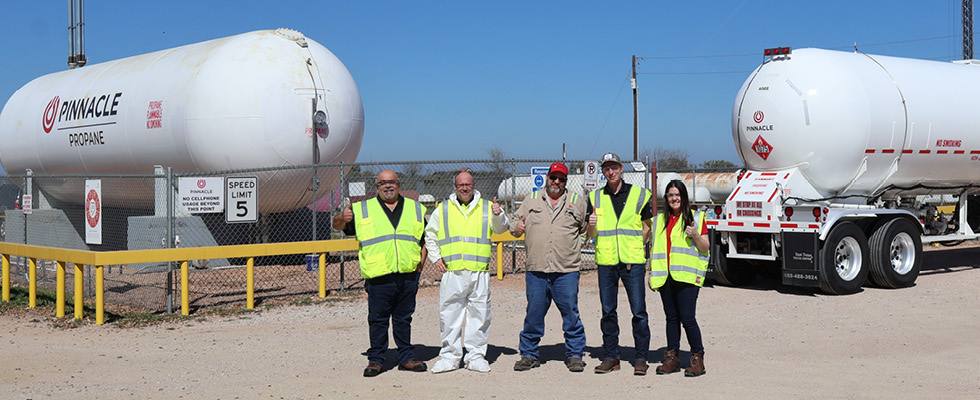
Renewable propane is positioned to be a viable path forward for an industry fighting against widespread electrification. The Propane Education & Research Council (PERC) describes renewable propane as a fuel with “the same great features as conventional propane — reliability, portability, power and reduced carbon emissions — but with even lower carbon emissions when compared with other energy sources.” Renewable propane can be produced as a byproduct of a variety of feedstocks, and because it’s produced from “bio-based or renewable sources,” it burns cleaner than conventional propane.
The rollout of renewable propane to marketers small and large across the country will come in stages, though some marketers have already taken the steps to introduce renewable propane to their customers. Pinnacle Propane is one such marketer. The company launched the first phase of its renewable propane program this spring in Texas, an exciting step forward for putting the energy-efficient fuel on the market. Ahead, hear from Dingeman Kooijman, Pinnacle’s vice president of commercial strategy and analytics, on how the company’s strategy prioritizes the protection of the environment while also recognizing the importance of giving customers choices to find solutions that meet their needs.
Can you describe how Pinnacle Propane is implementing renewable propane?
Kooijman: Since the start of 2024, we have secured small volumes of renewable propane. We are now actively collaborating with our customers to integrate renewable propane into their offerings. It starts with raising awareness about the benefits of renewable propane so the customer understands the value and can make informed decisions. Secondly, it is about providing flexibility to your customers so they can start at the pace that works for them. Sustainability is a journey and therefore we will offer three different blends — the “good,” the “better” and the “best” option, where the blend will range from 20% to 100% renewable propane. It doesn’t stop there; it is also about creating a favorable policy environment for customers that will accelerate the adoption of renewable propane and create awareness of renewable propane. By being a board member of the Low Carbon Fuel Coalition, a nonprofit trade association, we proactively support policymakers to create effective low-carbon fuel standards. I also joined PERC’s Leadership in Energy Ambassador program to promote renewable propane as a key player in the national energy dialogue.
Why is it a priority for Pinnacle to focus on renewable propane in the midst of evolving energy policies in the U.S.?
Our purpose is [to have the] courage to care for generations to come, where the health and well-being of customers, our communities and our planet is central. It is [not so much about] adapting [as it is] a promise to shape a future for our customers. Renewable propane aligns with our commitment to environmental responsibility by offering a practical solution for our customers to reduce their greenhouse gas emissions. This focus resonates with customers seeking sustainable energy options. Moreover, investing in renewable propane ensures resilience and adaptability in a changing regulatory landscape. By embracing renewable energy sources, Pinnacle meets evolving regulatory requirements and attracts customers looking for innovative and sustainable energy providers.
Why did the transportation market make the most sense as the first phase for your renewable propane program?
In 2023, the transportation industry saw significant new adoptions of renewable propane. The existing infrastructure for propane-powered vehicles and equipment provides a foundation for seamless integration of renewable propane. This minimizes barriers to entry and accelerates the transition to sustainable fuel solutions like renewable propane. The transportation sector is also increasingly prioritizing sustainability and seeking cleaner energy alternatives. Renewable propane offers a viable and cost-effective option for fleet operators, public transit agencies and other transportation stakeholders looking to reduce their carbon footprint and comply with environmental regulations or company ambitions. The combination of these factors made us decide to start focusing on the transportation market, which could range from school buses to forklift trucks.
How is this fuel option reducing CO2 emissions in the area and by how much?
The CO2 reduction depends on the renewable feedstock that is used. If you go for a 100% renewable propane offering, this can reduce CO2 emissions by up to 80%. However, for some customers, reducing their CO2 emissions even by 30% is still a great improvement. ... By offering levels of renewable propane blends, we offer maximum flexibility and choice to the customer and make a potential switch simple.
Can you describe the benefits that will be realized by the sectors Pinnacle is targeting for renewable propane?
In public transit, it reduces greenhouse gas emissions and lowers total cost of ownership compared to electric and diesel alternatives, enhancing sustainability and appealing to environmentally conscious passengers. School systems see improved air quality compared to gasoline, which benefits student health, along with substantial fuel and maintenance savings that can be redirected to educational programs. Forklift companies benefit from renewable propane’s superior performance versus electric through faster refueling times and cost-effective operations, leading to increased productivity and reduced downtime. Overall, renewable propane provides a cleaner, more cost-effective and dependable energy solution.
What messaging around pollution reduction will ensure success in getting customers in these sectors to implement renewable fueling options?
Highlighting the direct impact on public health, particularly in sensitive environments like schools and urban areas, is crucial. Messaging that emphasizes how renewable propane reduces harmful emissions like nitrogen oxides and particulate matter, leading to cleaner air and fewer respiratory issues, resonates strongly with decision-makers who prioritize community health and safety. Also, emphasizing the role of renewable propane in combating climate change appeals to the growing number of organizations committed to sustainability. Showcasing significant reductions in greenhouse gas emissions and the overall carbon footprint positions renewable propane as a viable and responsible choice for environmentally conscious companies.
Why is offering renewable propane to your customers a significant step for energy choice and sustainable fueling?
Firstly, it diversifies the energy landscape by providing alternatives to conventional propane and gives consumers options to meet their sustainable energy needs. In addition, it provides a cleaner, greener alternative that supports environmental goals, promotes resource efficiency and leverages existing infrastructure for easy adoption. This aligns with the growing demand for sustainable practices and positions businesses and consumers to lead in the transition to a more sustainable energy future.
How does Pinnacle’s renewable propane offering allow flexibility in finding the right solutions to its customers’ sustainability challenges?
Pinnacle’s renewable propane offering provides exceptional flexibility in addressing customers’ sustainability challenges through three distinct blends: “good,” “better” and “best.” The “good” blend offers 20% renewable propane for those starting their sustainability journey, delivering notable emission reductions without substantial cost increases. The “better” blend incorporates a higher renewable content of 50% for businesses ready to deepen their environmental commitment. The “best” blend, with 100% and the highest renewable propane content, is ideal for organizations aiming for the maximum environmental impact, significantly cutting greenhouse gas emissions and demonstrating leadership in sustainability. By offering these tailored blends, Pinnacle ensures that every customer can find a solution that aligns with their specific sustainability goals and operational needs. This tiered approach allows businesses to progressively transition to more sustainable practices, comply with evolving environmental regulations and enhance their corporate social responsibility profiles.
What are your plans for expanding your renewable propane program in Texas?
Pinnacle has the ambition to expand in Texas by focusing on strategic partnerships with other businesses and local governments. To facilitate a smooth transition to renewable propane, customer education is key, and Pinnacle will work on a comprehensive information program that will detail the environmental benefits of renewable propane. In addition, although the focus is now on Texas, we will roll it out in other states like New Mexico. As a board member of the Low Carbon Coalition, I’m excited that the coalition played an important role in New Mexico becoming the fourth state to enact Clean Transportation Fuel Standards to reduce emissions, which will support the adoption of renewable propane.
What are key takeaways you’ve observed from Pinnacle’s efforts to roll out renewable propane in Austin?
We are learning a lot about how companies think about environmental sustainability and the role that renewable fuels play in meeting their sustainability goals. This is an ever-evolving effort where Pinnacle, other propane companies, policymakers and end users are acting daily to shape the industry and create a new market. One key takeaway is the positive environmental impact, as renewable propane reduces carbon emissions compared to conventional propane, aligning with broader climate change mitigation goals. Secondly, the successful integration into existing infrastructure showcases its practicality and ease of adoption, indicating that renewable propane can seamlessly replace conventional propane without requiring major system overhauls. Finally, the importance of public education and awareness in this rollout cannot be overstated; educating consumers … about the benefits and distinctions of renewable propane is crucial for gaining support.


